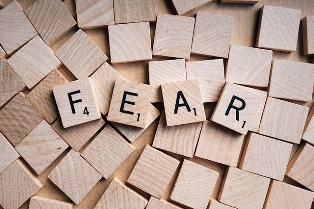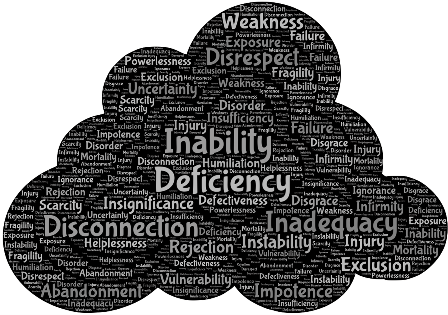Go On, Be Afraid

Fear.
Everyone at one point or another has tasted fear. Authors know fear and speak of it. Most authors fear the fear but even more have learned one vital lesson – fear is good.
Fear is a motivator, an instigater, a castigator, an illuminator, a paralyzer and an energizer. Fear is what makes us feel alive and makes us worry that we’re going to die. Fear is under so much of who we are as people, as writers, as stories. Fear is important. And you should be afraid! Fear comes from what we know and it comes from what we don’t know. It’s insidious and sneaky and delicious. Fear is important. We learn from our fears and we adapt because of them. When you can accept fear into your heart, then you may benefit from it. Yes, I’m saying it is important give in and be afraid.

First, let’s look at why I believe all those adjectives. When we are small, we develop fear of the unknown. This is where we put the things we don’t understand, into the shadow beyond the darkness. Such fear can motivate us to run or to fight. Fight or Flight syndrome comes from this basic fear. The fear of the unknown is challenging and can be paralyzing if we don’t learn to fight through it. Simply turning a corner on a dark road meets this fear. Keep turning the wheel, despite your fear. Delicious things come from pressing forward (safely please, unless you are a character).

Second, there is the kind of fear that instigates reactions. We fear getting surprised so we set up booby-traps. We fear being “taken” by a criminal so we trap them instead. We fear getting into a fight so we avoid that person. We fear what is around the bend, the corner, or off the road.This fear is more about what will happen to us and isn’t always good. But it is a wonderful tool for your traitors, your villains, your contagonists. Channel it.
Next there is the fear that illuminates. Studying for a test out of fear of failure can illuminate us to knowledge and behaviors (ours and our fellow students and teachers!). This kind of fear shines a light on our weaknesses and our needs. This fear can be used to aid others, provide that ah-ha moment, lead to discovery of clues or the ultimate takedown of the antagonist.

Castigation often follows fear. When we have been frightened and we don’t wish to be frightened again, we often castigate the perpetrators. Most often we find it riding on relief. It causes a plethora of negative emotions including vitriol, anger, hatred, childish jealousy, envy and back talk. This is when our mouths often overtake good sense. This fear is damaging. It is what parents often do their children. It is what heroes often do in frustration or a lover to a beloved. Use it wisely because it hurts.
Finally, there is the fear that energizes. I could write on and on about fear but let’s concentrate on this positive aspect. This fear makes us feel alive. The fear of not meeting a deadline (work, school, curfew). This fear motives, illuminates, castigates, paralyzes, frustrates, and – the best part – separates the determined from the unsure. THIS is the fear which often guides an author to guide the conflict in the stories. This energizing fear is the substance of good stories. It combines all the elements of fear into one positive stroke, using all the elements to culminate into a great ending (doesn’t have to be a happy one!).
Sure, authors are afraid of failure. We all fear not being accepted. We all fear bad reviews. But when the fear energizes, it can be channeled into producing action. And that action makes us feel excited and alive. Latch onto that feeling and ride it. Let it become you. Never give up or let fear of failure win. You can benefit if you try, and keep trying.

Fear can be good for you. A little stress gets the blood pumping, colors your cheeks, makes you feel giddy and goofy and tingly all over. Fear about the first time you had sex. Fear about going to that first scary movie. Fear about Halloween and the haunted house. Fear about that last manuscript, the one you had nightmares over and the one the beta readers ripped you apart over. (You know the one that turned out good in the end but kept you up for a month in frightful worry!).
As long as you use your fear productively, as long as you don’t let fear overtake your good sense or your ability to produce/function, fear is your friend. That’s why I say, let fear in. Let fear enliven you. Let fear spark your characters, bring reality to your stories, breathe tension to your novels and excitement to your publishing. Fear, used well, is good!

So go ahead. Be afraid. I’ll meet you in the shadows.
Thanks for coming by.
I remain, Yours Between the Lines,
Sherry















Terri A Wilson says:
Great post. If you weren’t my friend, I’d be afraid to meet you in th shadows.